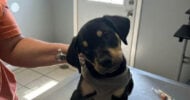I finished my residency training on June 30th, 2000, in a combined internal medicine and pediatrics residency program at Ohio State University and Columbus Children’s Hospital (before it was renamed Nationwide Children’s Hospital). One month later, I was slated to begin my first “adult” job as I joined a private family medicine practice in Southern Ohio – practicing traditional medicine (outpatient and inpatient care). There were no hospitalists back then in our neck of the woods. On the last day of my residency, I met with my internal medicine advisor and mentor at Ohio State University Medical Center for my residency exit interview.
Dr. M. was a kind and gentle physician. He was deeply knowledgeable, always professional, punctual, and very stern. He always wore his lab coat (starched and pressed) everywhere in the hospital, clinics, and anywhere a patient may see him. He always preached and promoted “professionalism” in the health care setting. He once sent me home during rounds because I was not wearing a necktie. It was 1999, and collarless dress shirts were the “in-thing” in men’s dresswear/fashionwear. It didn’t matter. “Go home, put on a respectable and professional dress shirt and necktie,” he angrily yet professionally uttered to me at the beginning of rounds. As a senior resident leading two interns, a team of medical students, pharmacists, and case managers, I was beyond embarrassed and mortified – especially considering that those words came from a man, a physician, an instructor I emulated, admired, and considered a father-figure to me in the medical world.
Roughly nine months later, I sat in his office for my exit interview and final farewell. I was excited, yet nervous. I wanted to thank him, hug him, and have a beer with him. But, out of fear and respect for his professionalism and stoic demeanor, I refrained. I merely planned to shake his hand firmly as we said our goodbyes. The meeting went well, but he was nervous. He wouldn’t, couldn’t look me in the eye – the first time in 4 years of my training.
So, I inquired: “Dr. M. Are you OK? What’s the matter?”
He paused, took a deep breath, and then replied: “Zoran, I want you to know that I gave you glowing remarks on your final residency review. Your knowledge base, your work ethic, and your patient care duties are exceptional. But I must admit that I wrote one negative comment on your review. I don’t want you to be upset with me. I consider us friends and colleagues now. So, I have to be honest with you.”
“What’s the negative comment?” I nervously inquired.
“I wrote that you’re too friendly, too jovial, and not professional enough with your patients and/or colleagues. You need to be more professional and not as friendly. I hope you’re not mad at me.”
I studied him as he sat at his desk nervously. I stood up, thanked him, shook his hand firmly, and then I hugged him, against his will.
“Dr. M, you consider that a negative trait. I consider it a compliment. So, I thank you!” I replied.
Fast forward 24 years later. I left my practice in 2008. I joined our newly created hospitalist team at our local hospital in 2008. I practiced both internal medicine and pediatrics hospital medicine until 2018 when I “retired” from pediatrics. Outside of practicing medicine, I have coached youth soccer leagues, my wife runs a 4-H group, and we are both very involved in our small-town local community. As such, over the years, I have grown to know, interact with, and befriend many of my former and current patients outside of the “medical world.” When my oldest son graduated high school in 2019, I felt like a father figure to many of his classmates as I cared for many of them and their families in my former office practice.
Over the years, our local hospital grew both in size and the services and specialties offered. As a result, they recruited “top talent,” many of whom resided in the Columbus area (1 to 1 1/2-hour commute) rather than the small-town Southern Ohio community in which I endeared as my own. Many of my friends and colleagues were baffled yet impressed with the knowledge, the histories, and the friendships I developed over the years with the mutual patients we cared for in our local hospital.
“These are my people. I know them. They know me. I coached soccer here and cared for many of the children, their parents, and their grandparents. My wife is a 4-H advisor to many of the local youth. It’s hard not to know them and their background. And it’s very hard not to befriend them. This is my village!” That was my usual response when questioned by my colleagues.
The COVID pandemic was especially brutal for me as I cared for, cried with, and attended funerals of local villagers/community members, former patients, and friends.
Since my first days in my “adult job” as an attending physician in 2000, I have always begun the medical interview, the HOPI (History of Present Illness), and many clinical interactions with the question: “So, what’s your story?” In doing so, I opened the door for patients and allowed them to tell what ails them, what concerns they have, and what common interests we may share. In doing so, I occasionally befriend that patient, gain their trust, and, most importantly, strive to better care for him/her. The net result of such an approach in my 24 years working and living in this small community is the adoration, respect, and devotion I have for the people, my people, of Southern Ohio.
Unfortunately, in today’s medical environment, where throughput, efficiency, length of stay, and timely discharges play vital roles in our health care delivery, we health care providers often do not embrace, cherish, or even have the time to hear “their story.” As such, patient care suffers, trust in the medical community falters, and patient satisfaction continues to plummet. Maybe, we as a health care community should focus more efforts on the narratives of the patients than the metrics by which we measure quality and throughput. In doing so, perhaps we will all succeed in delivering better care and outcomes to our communities and patients – the very reason we chose this profession.
With homage to my mentor, advisor, and friend, Dr. M., I thank you for all the years, the advice, the knowledge, and the confidence you bestowed upon me. But so that you know, I haven’t worn a tie in many years. And that’s my story!
Zoran Naumovski is a hospitalist.





















![Sabbaticals provide a critical lifeline for sustainable medical careers [PODCAST]](https://kevinmd.com/wp-content/uploads/The-Podcast-by-KevinMD-WideScreen-3000-px-3-190x100.jpg)

![Teaching joy transforms the future of medical practice [PODCAST]](https://kevinmd.com/wp-content/uploads/Design-1-1-190x100.jpg)
